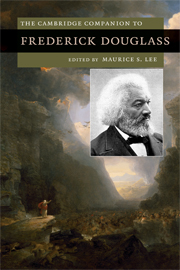Book contents
- Frontmatter
- Introduction
- 1 Douglass’s Self-Making and the Culture of Abolitionism
- 2 Identity in the Autobiographies
- 3 Douglass as Orator and Editor
- 4 Crisis and Faith in Douglass’s Work
- 5 Violence, Manhood, and War in Douglass
- 6 Human Law and Higher Law
- 7 Sentimental Douglass
- 8 Douglass among the Romantics
- 9 Douglass’s Black Atlantic: Britain, Europe, Egypt
- 10 Douglass’s Black Atlantic: The Caribbean
- 11 Douglass, Ideological Slavery, and Postbellum Racial Politics
- 12 Born into Slavery: Echoes and Legacies
- Guide to Further Reading
- Index
6 - Human Law and Higher Law
Published online by Cambridge University Press: 28 July 2009
- Frontmatter
- Introduction
- 1 Douglass’s Self-Making and the Culture of Abolitionism
- 2 Identity in the Autobiographies
- 3 Douglass as Orator and Editor
- 4 Crisis and Faith in Douglass’s Work
- 5 Violence, Manhood, and War in Douglass
- 6 Human Law and Higher Law
- 7 Sentimental Douglass
- 8 Douglass among the Romantics
- 9 Douglass’s Black Atlantic: Britain, Europe, Egypt
- 10 Douglass’s Black Atlantic: The Caribbean
- 11 Douglass, Ideological Slavery, and Postbellum Racial Politics
- 12 Born into Slavery: Echoes and Legacies
- Guide to Further Reading
- Index
Summary
In setting the standards for what is or is not appropriate behavior, parents and children frequently confront an important distinction in the quality and nature of rulemaking. Certain acts are prohibited or required simply because the rulemaker decides it must be so and has the power to insist on obedience. When the child asks, “Why must I make my bed before breakfast?” the parent replies, “Because I say so.” Other rules, however, seem weightier or more profound. Prohibitions on bullying other children or teasing one’s pet often come with a conversation about values, such as kindness, reverence for life, or the golden rule.
Applying this commonplace distinction to the workings of a legal system often leads to confusion. In his famous essay, “The Path of the Law,” Oliver Wendell Holmes, Jr. cautions us not to mistake law for morality. To understand the law, Holmes argues, “you must look at it as a bad man, who cares only for the material consequences which such knowledge enables him to predict, not as a good one, who finds his reasons for conduct, whether inside the law or outside of it, in the vaguer sanctions of conscience.” Like the child responding to a command that carries no more profound justification than the will of the parental lawmaker, the “bad man” studies the law in order to predict what kinds of actions will get him into trouble (regardless of whether he finds such acts morally reprehensible or not). In Holmes’s view, the language of law can sound like the language of morality, but one only has to recollect that “many laws … enforced in the past” and “enforced now … are condemned by the most enlightened opinion of the time” to see the necessity for distinguishing between legal and moral discourses.
- Type
- Chapter
- Information
- The Cambridge Companion to Frederick Douglass , pp. 89 - 102Publisher: Cambridge University PressPrint publication year: 2009

